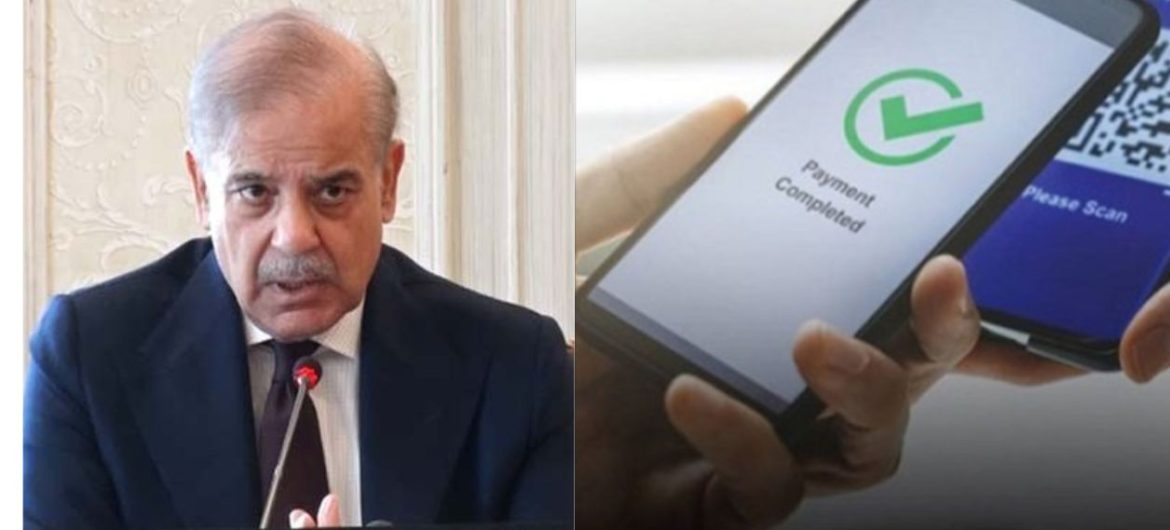Prime Minister Endorses National Digital Transformation Plan
Prime Minister Shehbaz Sharif has formally approved the “Cashless Pakistan Strategy”, a landmark initiative designed to accelerate the country’s transition toward a digital and cashless economy. The plan is part of a broader effort to enhance financial transparency, modernize tax collection, and simplify money transfers across the nation.
According to officials, the government envisions a gradual shift away from cash-based transactions — a move seen as essential for curbing corruption, improving documentation, and integrating Pakistan’s economy into the global digital system.
Government Targets Digital Transactions Worth Rs1.15 Trillion
Presenting a detailed report to Parliament, Finance Minister Senator Muhammad Aurangzeb outlined the strategy’s objectives and milestones. He revealed that for the current fiscal year, the government has set a target of Rs115 billion in digital transactions.
The minister emphasized that by June 2026, the goal is to increase the volume of digital payments from the current Rs705 billion to Rs1.15 trillion. This represents a substantial 63% growth, highlighting the government’s focus on digital inclusion and financial innovation.
Aurangzeb added that the plan includes expanding the network of merchants using digital payment tools, such as QR codes, to two million nationwide. This expansion aims to make electronic payments accessible and convenient even for small businesses and street vendors.
Expanding Digital Payment Apps and Remittance Channels
The government also plans to raise the number of digital payment app users from 95 million to 120 million within the next two years. This would bring nearly half of Pakistan’s population into the formal digital financial ecosystem.
At the same time, efforts are under way to ensure that 100% of foreign remittances — a critical source of income for Pakistan, worth over US$30 billion annually — are received through digital channels. Officials believe this will help reduce transaction costs and ensure greater transparency in the remittance process.
Aurangzeb noted that robust digital infrastructure is being developed nationwide, including enhanced connectivity, cybersecurity frameworks, and reliable internet access in remote areas.
RAAST System to Digitize All Government Payments
A key pillar of the strategy is the “RAAST System”, Pakistan’s instant payment platform developed by the State Bank of Pakistan (SBP). Under this system, all government payments and receipts — including salaries, pensions, and welfare disbursements — are being transitioned to digital mode.
The finance minister explained that this will not only speed up transactions but also improve accountability and record-keeping. The RAAST platform allows citizens to receive payments directly into their bank accounts using a simple mobile number, eliminating the need for intermediaries.
In addition, the government is strengthening the Digital Nation Pakistan Programme, an initiative that promotes the use of technology in public services, business, and education. Efforts are being made to improve internet accessibility, particularly in rural and underserved regions, ensuring that no citizen is left behind in the digital transformation.
Banks Directed to Implement QR Code System Nationwide
To ensure widespread adoption, the finance minister has instructed all banks and financial institutions to implement RAAST QR codes across their networks. This system will allow customers to make payments instantly by scanning codes — a feature already common in countries such as China, India, and Malaysia.
Aurangzeb said that a transparent, fast, and interoperable payment ecosystem is essential for Pakistan’s economic modernization. The integration of QR payments, he added, will reduce dependency on cash, enhance tax compliance, and empower small traders.
Towards a Transparent and Inclusive Digital Economy
Experts say the “Cashless Pakistan Strategy” could play a transformative role in formalizing the economy and bringing millions of unbanked citizens into the financial system. However, challenges remain — including cybersecurity risks, low digital literacy, and unequal access to technology.
Still, the government’s commitment signals a significant step toward financial inclusion and economic modernization. If implemented effectively, the initiative could help Pakistan align with global trends in digital finance, reduce leakages in public funds, and encourage innovation in fintech.















